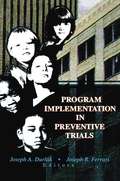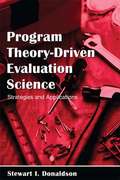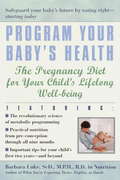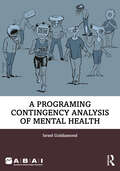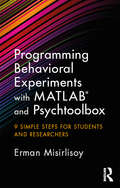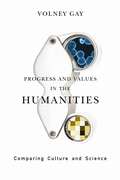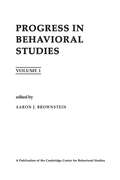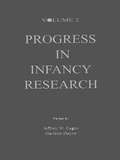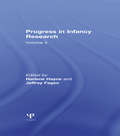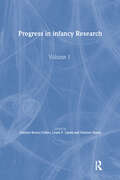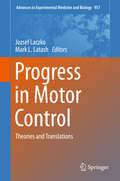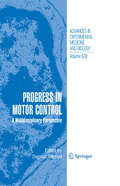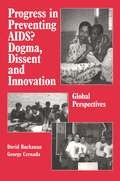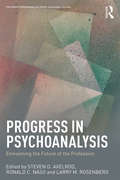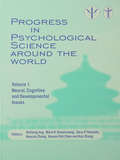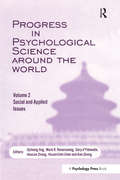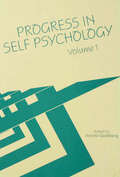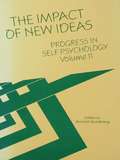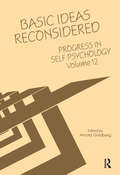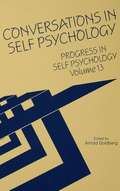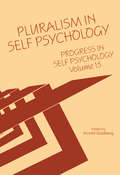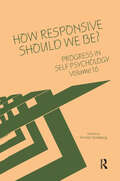- Table View
- List View
Program Implementation in Preventive Trials
by Joseph R Ferrari Joseph A DurlakProgram Implementation in Preventive Trials shows you how you can take a more active part in program evaluation and how you can direct existing programs toward new horizons of more effective service. In this concise, focused look at community-based psychology and its operative programs, you’ll see how and why community programs should be comprehensively evaluated. You’ll see the importance of understanding how interventions were conducted before making conclusions about a program’s impact, and you’ll discover why there’s an ever-widening gap between what is planned and what actually gets implemented in community-based programs.In short, Program Implementation in Preventive Trials helps you see the increasing need for the assessment of implementation, the “active” side of community psychology. You’ll gain instant understanding as to why there’s a need for constant monitoring of a program’s use, and you’ll find answers to the following questions that continue to plague community psychologists who are interested in implementing programs of change: Does the current personnel follow the implementation program? Will new members to the setting understand and utilize the procedures developed for that setting? Will the procedures be modified such that their utility decreases? Specifically, you’ll read about: how to ensure intervention programs are conducted as planned why implementation data should be collected what protocol compliance is and its role in treatment programs when to be flexible so modifications can be made in program procedures who can enhance program adherence by “buying in” to a multi-change agent approach where cultural sensitivity helps programs be more faithfully adopted and conductedIf you’re a scholar or a student interested in studying the fundamental issue of implementation, you’ll definitely want to see what these professionals have compiled in Program Implementation in Preventive Trials. You’ll find that your program agenda, however beneficial it is now, will only be raised and elevated to a new level of performance by the positive examples and research carefully collected here.
Program Theory-Driven Evaluation Science: Strategies and Applications
by Stewart I. DonaldsonProgram Theory-Driven Evaluation Science fills the gap between 21st century literature on evaluation and what is happening in practice. It features detailed examples of how evaluations actually unfold in practice to develop people, programs, and organizations. Commonly accepted strategies for practicing evaluation are outlined, followed by comprehe
Program Your Baby's Health: The Pregnancy Diet for Your Child's Lifelong Well-Being
by Tamara Eberlein Barbara LukeThe most important period of your child's health is the nine months before birth. Cutting edge research in a new field known as "metabolic programming" reveals a startling new fact: what a mother eats during pregnancy has a far greater effect on her child's future development, overall health, and resistance to disease than was previously thought. In fact, adult chronic illnesses long blamed on an unhealthy lifestyle or genetic influences are now believed to be a direct result of the uterine environment during pregnancy. Now, thanks to this pioneering new book, you can "program" your baby's future health by eating right, gaining the appropriate amount of weight, and avoiding toxins--starting even before conceiving. Dr. Barbara Luke, a nationally recognized expert in the field of public-health nutrition, provides a complete, practical nutrition and lifestyle program that covers your entire pregnancy, month by month--and the first two years of your baby's life. Here is everything you need to know to raise the healthiest baby possible, including: - What to eat when you're trying to conceive and when you are pregnant - Practical strategies that protect your child against hypertension, diabetes, and obesity - Special dietary needs for women in every age group, from under 25 to over 40 - Quick, easy menus, helpful charts, and checklists - Replenishing fluids: how much do you need to drink? - The nutritional needs of mothers carrying twins or "super-twins" - New strategies for overcoming morning sickness - Helping your growing child eat right and stay healthy Pregnancy is your window of opportunity to boost your baby's health at birth, through childhood, and beyond. Let this book help you take the most advanced, scientific approach to preventing disease and optimizing health! From the Trade Paperback edition.
A Programing Contingency Analysis of Mental Health (Behavior Science)
by Israel GoldiamondA Programing Contingency Analysis of Mental Health presents Dr. Israel Goldiamond’s reflections on various ways we formulate behavioral and emotional problems, most often in traditional terms of mental health disorders, mental diseases or illnesses, psychopathological disorders, and so on – what he calls a pathological orientation. Here, Goldiamond argues for a groundbreaking alternative view from the vantage point of radical behaviorism. The book begins by discussing contingency relations between behavior and its past and present consequences, along with other environmental events. It reminds us that this approach sits comfortably alongside other consequential systems in the social and biological sciences, particularly decision theory and evolution. This behaviorist system regards most important human behaviors as being emitted rather than stimulus-elicited. Described are some of the diverse origins of behavior, including the effects of environmental consequences and the programing procedures of social and cultural inheritance. The exposition includes decision matrices which rationalize some of the programed patterns and the accompanying thoughts and emotions commonly found in mental illness. As a result of this nonlinear contingency analysis, such patterns may be considered adaptive rather than maladaptive. The book describes programs based on those matrices and outlines how they might be applied to mitigate any problems or costs associated with those patterns. The book concludes by moving from individual analysis to social analysis, with particular reference to some societal contingencies that may maintain the pathological orientation and others that might shift our gaze in the direction proposed here. Alongside Dr. Goldiamond’s original work, this volume features a new introduction from Dr. Paul Thomas Andronis and Dr. T. V. Joe Layng, as well as an article tracing the history of the non-linear thinking of Dr. Goldiamond, first published in The Behavior Analyst. It will be a must-read for anyone working in the analysis of and clinical intervention in problems associated with mental health, or those more generally interested in the work of Israel Goldiamond.
Programming Behavioral Experiments with MATLAB and Psychtoolbox: 9 Simple Steps for Students and Researchers
by Erman MisirlisoyHuman behavior is fascinating so it’s no surprise that psychologists and neuroscientists spend their lives designing rigorous experiments to understand it. MATLAB is one of the most widely used pieces of software for designing and running behavioral experiments, and it opens up a world of quick and flexible experiment programming. This book offers a step-by-step guide to using MATLAB with Psychtoolbox to create customisable experiments. Its pocket size and simple language allow you to get straight to the point and help you to learn fast in order to complete your work in great time. In nine simple steps, it guides you all the way from setting parameters for your experiment to analysing the output. Gone are the daunting days of working through hundreds of irrelevant and complicated documents, as in this handy book, Erman Misirlisoy coaxes you in the right direction with his friendly and encouraging tricks and tips. If you want to learn how to develop your own experiments to collect and analyse behavioral data, then this book is a must-read. Whether you are a student in experimental psychology, a researcher in cognitive neuroscience, or simply someone who wants to run behavioral tasks on your friends for fun, this book will offer you the skills to succeed.
Progress and Values in the Humanities: Comparing Culture and Science
by Volney GayMoney and support tend to flow in the direction of economics, science, and other academic departments that demonstrate measurable "progress." The humanities, on the other hand, offer more abstract and uncertain outcomes. A humanist's objects of study are more obscure in certain ways than pathogens and cells. Consequently, it seems as if the humanities never truly progress. Is this a fair assessment?By comparing objects of science, such as the brain, the galaxy, the amoeba, and the quark, with objects of humanistic inquiry, such as the poem, the photograph, the belief, and the philosophical concept, Volney Gay reestablishes a fundamental distinction between science and the humanities. He frees the latter from its pursuit of material-based progress and restores its disciplines to a place of privilege and respect. Using the metaphor of magnification, Gay shows that, while we can investigate natural objects to the limits of imaging capacity, magnifying cultural objects dissolves them into noise. In other words, cultural objects can be studied only within their contexts and through the prism of metaphor and narrative. Gathering examples from literature, art, film, philosophy, religion, science, and psychoanalysis, Gay builds a new justification for the humanities. By revealing the unseen and making abstract ideas tangible, the arts create meaningful wholes, which itself is a form of progress.
Progress in Behavioral Social Work (Routledge Library Editions: Psychiatry #22)
by Bruce A. Thyer Walter W. HudsonOriginally published in 1987, here are up-to-the-minute insights and perspectives on the application of the principles of behavioralism to social work practice. The foremost authorities in the field of behavioral social work provided important empirically based practice and qualitative research findings that effectively illustrated the validity of behavioral approaches to social work. This practical volume features original research findings that employ either conventional group research methods or single-subject approaches to practice evaluation; comprehensive reviews of the state of the art in behavioral social work; and treatment modalities, including individual, marital and family, and group interventions. All in all, this title has the information professionals needed to keep abreast of the developments in this field at the time.
Progress in Behavioral Studies: Volume 1
by A. J. Brownstein R. Epstein P. HarzemAdvancing the study of behavior and its humane applications in society, this book explores behavioral studies and the analysis of behavior.Progress in Behavioral Studies outlines the contributions of behavioral science to education, behavioral medicine, and other related disciplines. Individual papers report on progress made through the cautious introduction of quantitative formulations into analysis, the increased interchange of analysis with other disciplines such as economics and ethology, and the continuation of behavioral science as a basis for understanding more complex phenomena.
Progress in infancy Research: Volume 2 (Progress in Infancy Research Series)
by Jeffrey W. Fagen Harlene HayneThe Progress in Infancy Research Series is dedicated to the presentation of innovative and exciting research on infants, both human and animal. Each volume in the series is designed to stand alone and contains autonomous chapters which are based on high quality programs of research with infants. These chapters integrate the work of the authors with that of other experts working in the same or related areas. The authors wish to present high quality critical syntheses bearing on infant perception and sensation, learning and memory processes, and other aspects of development. This series will be a forum for the presentation of technological breakthroughs, methodological advances, and new integrations that might create platforms for future programmatic work on the complexities of infant behavior and development. Each volume in the series is dedicated to an outstanding investigator whose research has illuminated the nature of infant behavior and development, and whose contributions to the field have been of seminal importance.
Progress in infancy Research: Volume 3 (Progress In Infancy Research Ser.)
by Harlene Hayne Jeffrey FagenThe Progress in Infancy Research Series is dedicated to the presentation of innovative and exciting research on infants, both human and animal. Each volume in the series is designed to stand alone and contains autonomous chapters which are based on high quality programs of research with infants. These chapters integrate the work of the authors with that of other experts working in the same or related areas. The authors wish to present high quality critical syntheses bearing on infant perception and sensation, learning and memory processes, and other aspects of development. This series will be a forum for the presentation of technological breakthroughs, methodological advances, and new integrations that might create platforms for future programmatic work on the complexities of infant behavior and development. Each volume in the series is dedicated to an outstanding investigator whose research has illuminated the nature of infant behavior and development, and whose contributions to the field have been of seminal importance.
Progress in infancy Research: Volume 1
by Lewis P. Lipsitt Harlene Hayne Carolyn Rovee-CollierThe Progress in Infancy Research Series is dedicated to the presentation of innovative and exciting research on infants, both human and animal. Each volume in the series is designed to stand alone and contains autonomous chapters which are based on high quality programs of research with infants. These chapters integrate the work of the authors with that of other experts working in the same or related areas. The authors wish to present high quality critical syntheses bearing on infant perception and sensation, learning and memory processes, and other aspects of development. This series will be a forum for the presentation of technological breakthroughs, methodological advances, and new integrations that might create platforms for future programmatic work on the complexities of infant behavior and development. Each volume in the series is dedicated to an outstanding investigator whose research has illuminated the nature of infant behavior and development, and whose contributions to the field have been of seminal importance.
Progress in Motor Control
by Jozsef Laczko Mark L. LatashThis single volume brings together both theoretical developments in the field of motor control and their translation into such fields as movement disorders, motor rehabilitation, robotics, prosthetics, brain-machine interface, and skill learning. Motor control has established itself as an area of scientific research characterized by a multi-disciplinary approach. Its goal is to promote cooperation and mutual understanding among researchers addressing different aspects of the complex phenomenon of motor coordination. Topics covered include recent theoretical advances from various fields, the neurophysiology of complex natural movements, the equilibrium-point hypothesis, motor learning of skilled behaviors, the effects of age, brain injury, or systemic disorders such as Parkinson's Disease, and brain-computer interfaces.
Progress in Motor Control
by Dagmar SternadThis ground-breaking book brings together researchers from a wide range of disciplines to discuss the control and coordination of processes involved in perceptually guided actions. The research area of motor control has become an increasingly multidisciplinary undertaking. Understanding the acquisition and performance of voluntary movements in biological and artificial systems requires the integration of knowledge from a variety of disciplines from neurophysiology to biomechanics.
Progress in Preventing AIDS?: Dogma, Dissent and Innovation - Global Perspectives
by David Ross Buchanan George Peter CernadaOriginally published in the "International Quarterly of Community Health Education", this work presents twenty-one chapters about the state of HIV/AIDS prevention programs in a global context.
Progress in Psychoanalysis: Envisioning the future of the profession (Philosophy and Psychoanalysis)
by Steven D. Axelrod Ronald C. Naso Larry M. RosenbergIs psychoanalysis in decline? Has its understanding of the human condition been marginalized? Have its clinical methods been eclipsed by more short-term, problem-oriented approaches? Is psychoanalysis unable (or unwilling) to address key contemporary issues and concerns? With contributors internationally recognized for their scholarship, Progress in Psychoanalysis: Envisioning the Future of the Profession offers both an analysis of how the culture of psychoanalysis has contributed to the profession’s current dilemmas and a description of the progressive trends taking form within the contemporary scene. Through a broad and rigorous examination of the psychoanalytic landscape, this book highlights the profession’s very real progress and describes a vision for its increased relevance. It shows how psychoanalysis can offer unparalleled value to the public. Economic, political, and cultural factors have contributed to the marginalization of psychoanalysis over the past 30 years. But the profession’s internal rigidity, divisiveness, and strong adherence to tradition have left it unable to adapt to change and to innovate in the ways needed to remain relevant. The contributors to this book are prominent practitioners, theoreticians, researchers, and educators who offer cogent analysis of the culture of psychoanalysis and show how the profession’s foundation can be strengthened by building on the three pillars of openness, integration, and accountability. This book is designed to help readers develop a clearer vision of a vital, engaged, contemporary psychoanalysis. The varied contributions to Progress in Psychoanalysis exemplify how the profession can change to better promote and build on the very real progress that is occurring in theory, research, training, and the many applications of psychoanalysis. They offer a roadmap for how the profession can begin to reclaim its leadership in wide-ranging efforts to explore the dynamics of mental life. Readers will come away with more confidence in psychoanalysis as an innovative enterprise and more excitement about how they can contribute to its growth.
Progress in Psychological Science around the World. Volume 1 Neural, Cognitive and Developmental Issues.: Proceedings of the 28th International Congress of Psychology
by Qicheng Jing Mark R. Rosenzweig Géry D'Ydewalle Houcan Zhang Hsuan-Chih Chen Kan ZhangProgress in Psychological Science around the World, Volumes 1 and 2, present the main contributions from the 28th International Congress of Psychology, held in Beijing in 2004. These expert contributions include the Nobel laureate address, the Presidential address, and the Keynote and State-of-the-Art lectures. They are written by international leaders in psychology from 25 countries and regions around the world. The authors present a variety of approaches and perspectives that reflect cutting-edge advances in psychological science. This first volume addresses neural, cognitive, and developmental issues in contemporary psychology. It includes chapters on learning, memory, and motivation, cognitive neuroscience, and attention, emotion, and language, and covers life-span developmental psychology. Volume 2 goes on to discuss social and applied issues in modern psychology. Progress in Psychological Science around the World, with its broad coverage of psychological research and practice, and its highly select group of world renowned authors, will be invaluable for researchers, professionals, teachers, and students in the field of psychology.
Progress in Psychological Science Around the World. Volume 2: Proceedings of the 28th International Congress of Psychology
by Qicheng Jing, Mark R. Rosenzweig, Géry d’Ydewalle, Houcan Zhang, Hsuan-Chih Che, and Kan ZhangProgress in Psychological Science around the World, Volumes 1 and 2, present the main contributions from the 28th International Congress of Psychology, held in Beijing in 2004. These expert contributions include the Nobel laureate address, the Presidential address, and the Keynote and State-of-the-Art lectures. They are written by international leaders in psychology from 25 countries and regions around the world. The authors present a variety of approaches and perspectives that reflect cutting-edge advances in psychological science. This second volume builds on the coverage of neural, cognitive, and developmental issues from the first volume, to address social and applied issues in modern psychology. The topics covered include: educational psychology and measurement, health psychology, and social and cultural psychology. Organizational, applied, and international psychology are also discussed. Progress in Psychological Science around the World, with its broad coverage of psychological research and practice, and its highly select group of world renowned authors, will be invaluable for researchers, professionals, teachers, and students in the field of psychology.
Progress in Self Psychology, V. 1: The Evolution Of Self Psychology (Guilford Psychology Texts Ser.)
by Arnold GoldbergThe premier volume in the Progress in Self Psychology Series was completed two years after Heinz Kohut's death in 1981. Hence, this volume has a unique status in the history of self psychology: it bears the imprint of Kohut while charting a course of theoretical and clinical growth in the post-Kohut era. Biographical reminiscences about Kohut (Strozier, Miller) and commentaries on Kohut's "The Self-Psychological Approach to Defense and Resistance" [chapter seven of How Does Analysis Cure?] (M. Shane, P. Tolpin, Brandchaft, Oremland) are juxtaposed with a section of self-psychological reassessments of interpretations (Basch, A. and P. Ornstein, Goldberg). Clinical papers cover the selfobject transferences (Hall, Shapiro), patient compliance (Wolfe), and the "self-pity response" (Wilson), while theoretical contributions present ideas of Stolorow, Bacal, White, and Detrick that are foundational to their subsequent writings. This volume helped to shape the theoretical and clinical agenda of self psychology in the decades following Kohut's death.
Progress in Self Psychology, V. 10: A Decade of Progress
by Arnold GoldbergThe tenth volume in the Progress in Self Psychology series begins with four timely assessments of the selfobject concept, followed by a section of clinical papers that span the topics of homosexuality, alter ego countertransference, hypnosis, trauma, dream theory, and intersubjective approaches to conjoint therapy. Section III, "A Dialogue of Self Psychology," offers Merton Gill's astute appreciation of "Heinz Kohut's Self Psychology," followed by commentaries by Leider and Stolorow and Gill's reply. The concluding section offers Stolorow and Atwood's "The Myth of the Isolated Mind," followed by discussions by Gehrie and the Shanes. A forum for the kind of spirited, productive exchanges that have long found a home within the self-psychological community, A Decade of Progress builds on the past in responding to the theoretical and clinical challenges of the present.
Progress in Self Psychology, V. 11: The Impact of New Ideas (Guilford Psychology Texts Ser.)
by Arnold GoldbergVolume 11 begins with a timely assessment of self psychology and intersubjectivity theory, with original contributions by Carveth, Trop, and Powell, and a critical commentary by P. Ornstein. Clinical studies span the transferences, the complementarity of individual and group therapy, the termination phase, and multiple personality disorder. A special section of "dying and mourning" encompasses women professionals and suicide, the self psychology of the mourning process, and the selfobject function of religious experience with the dying patient. The volume concludes with theoretical and applied studies of personality testing in analysis, writer's block, "The Guilt of the Tragic Man," and the historical significance of self psychology. A testimony to the evolutionary growth of self-psychology, The Impact of New Ideas will be warmly welcomed by readers of the Progress in Self Psychology series.
Progress in Self Psychology, V. 12: Basic Ideas Reconsidered
by Arnold GoldbergVolume 12 of the Progress in Self Psychology series begins with reassessments of frustration and responsiveness, optimal and otherwise, by MacIsaac, Bacal and Thomson, the Shanes, and Doctors. The philosophical dimension of self psychology is addressed by Riker, who looks at Kohut's bipolar theory of the self, and Kriegman, who examines the subjectivism-objectivism dialectic in self psychology from the standpoint of evolutionary biology. Clinical studies focus on self- and mutual regulation in relation to therapeutic action, countertransference and the curative process, and the consequences of the negative selfobject in early character formation. A separate section of child studies includes a case study exemplifying a self-psychological approach to child therapy and an examination of pathological adaptation to childhood parent loss. With a concluding section of richly varied studies in applied self psychology, Basic Ideas Reconsidered promises to be basic reading for all students of contemporary self psychology.
Progress in Self Psychology, V. 13: Conversations in Self Psychology
by Arnold GoldbergVolume 13 provides valuable examples of the very type of clinically grounded theorizing that represents progress in self psychology. The opening section of clinical papers encompasses compensatory structures, facilitating responsiveness, repressed memories, mature selfobject experience, shame in the analyst, and the resolution of intersubjective impasses. Two self-psychologically informed approaches to supervision are followed by a section of contemporary explorations of sexuality. Contributions to therapy address transference and countertransference issues in drama therapy, an intersubjective approach to conjoint family therapy, and the subjective worlds of profound abuse survivors. A concluding section of studies in applied self psychology round out this broad and illuminating survey of the field.
Progress in Self Psychology, V. 14: The World of Self Psychology
by Arnold GoldbergVolume 14 of Progress in Self Psychology, The World of Self Psychology, introduces a valuable new section to the series: publication of noteworthy material from the Kohut Archives of the Chicago Institute for Psychoanalysis. In this volume, "From the Kohut Archives" features a selection of previously unpublished Kohut correspondence from the 1940s through the 1970s. The clinical papers that follow are divided into sections dealing with "Transference and Countertransference," "Selfobjects and Objects," and " Schizoid and Psychotic Patients." As Howad Bacal explains in his introduction, these papers bear witness to the way in which self psychology has increasingly become a relational self psychology - a psychology of the individual's experience in the context of relatedness. Coburn's reconstrual of "countertransference" as an experience of self-injury in the wake of unresponsiveness to the analyst's own selfobject needs; Livingston's demonstration of the ways in which dreams can be used to facilitate "a playful and metaphorical communication between analyst and patient"; Gorney's examination of twinship experience as a fundamental goal of analytic technique; and Lenoff's emphasis on the relational aspects of "phantasy selfobject experience" are among the highlights of the collection. Enlarged by contemporary perspectives on gender and self-experience and a critical examination of "Kohut, Loewald, and the Postmoderns," Volume 14 reaffirms the position of self psychology at the forefront of clinical, developmental, and conceptual advance.
Progress in Self Psychology, V. 15: Pluralism in Self Psychology
by Arnold GoldbergVolume 15 of Progress in Self Psychology conveys the rich pluralism of contemporary self psychology with respect to a central theoretical and clinical issue: the nature of the self and the manner in which is can best be studied. This topic is initially addressed through a series of papers reassessing selfobject transferences and the selfobject function of interpretation. It is then approached via the theory of psychoanalytic technique, with papers that focus on boundaries and intimacy and on "Surface, Depth, and the Isolated Mind". And it culminates in two case studies that elicit animated discussion delineating different perspectives - intersubjective, motivational systems, and self-selfobject - on the self in relation to the therapeutic process. Two studies comparing Melanie Klein and Heinz Kohut; a discussion of how current cultural attitudes affect parenting; a relational view of the therapeutic partnership; and an integration of Silvan Tomkin's affect theory with self psychology add breadth to this timely and provocative collection. Volume 15 includes additional letters from the Kohut Archives and a moving account of Kohut's struggle with his own impending death.
Progress in Self Psychology, V. 16: How Responsive Should We Be?
by Arnold GoldbergVolume 16 of Progress in Self Psychology, How Responsive Should We Be, illuminates the continuing tension between Kohut's emphasis on the patient's subjective experience and the post-Kohutian intersubjectivists' concern with the therapist's own subjectivity by focusing on issues of therapeutic posture and degree of therapist activity. Teicholz provides an integrative context for examining this tension by discussing affect as the common denominator underlying the analyst's empathy, subjectivity, and authenticity. Responses to the tension encompass the stance of intersubjective contextualism, advocacy of "active responsiveness," and emphasis on the thorough-going bidirectionality of the analytic endeavor. Balancing these perspectives are a reprise on Kohut's concept of prolonged empathic immersion and a recasting of the issue of closeness and distance in the analytic relationship in terms of analysis of "the tie to the negative selfobject." Additional clinical contributions examine severe bulimia and suicidal rage as attempts at self-state regulation and address the self-reparative functions that inhere in the act of dreaming. Like previous volumes in the series, volume 16 demonstrates the applicability of self psychology to nonanalytic treatment modalities and clinical populations. Here, self psychology is brought to bear on psychotherapy with placed children, on work with adults with nonverbal learning disabilities, and on brief therapy. Rector's examination of twinship and religious experience, Hagman's elucidation of the creative process, and Siegel and Topel's experiment with supervision via the internet exemplify the ever-expanding explanatory range of self-psychological insights.
